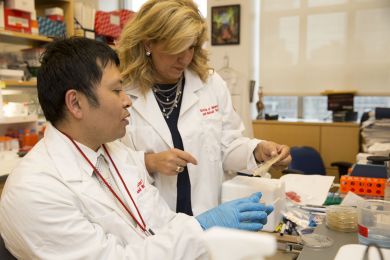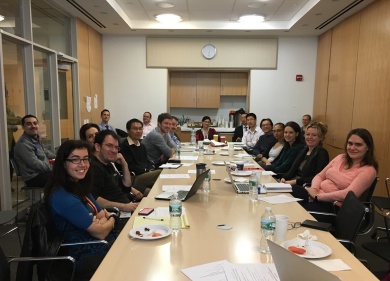Getting a GRASP on the R01 Funding Process
They’ve mastered the art of assays and PCRs, deciphered Western blots and genome sequencing reports, spliced genes, and created organoids and avatars. But for many early career scientists, the biggest challenge as they launch their own labs is dotting the i’s and crossing the t’s on applications for grants to fund their burgeoning research.
The new Grant Review and Support Program (GRASP) at Weill Cornell Medicine aims to address this need by training assistant professor and instructor level investigators to successfully submit their first National Institutes of Health (NIH) R01 proposal, the oldest and most prestigious level of government funding for health and medical research.
“The most dangerous time for a young investigator is the first two years of independent research,” said GRASP mentor Joseph Scandura, M.D., Ph.D. “By this point in an investigator’s career, you are trained to conduct research, but not equipped with the skills to fund this research. GRASP can be instrumental in bridging this gap.”
“It is a fantastic initiative that provides long-term support and project management tools to maximize the chances that our junior faculty obtain an NIH R01 grant on their first or second attempt,” added Paraskevi Giannakakou, Ph.D., Director of Laboratory Research in the Division of Hematology and Medical Oncology, who leads the program.
Modeled after a similar program at Harvard, which began in 2011, Weill Cornell’s GRASP launched in November 2015, with an inaugural two-day workshop involving 23 participants from 11 departments and divisions from across the institution.
The directors of the Harvard program -- Steven Freedman, M.D., Ph.D., and Camilia Martin, M.D. -- were on site to share their insights. They discussed how to determine “readiness” to apply for R01 grants, outlined the NIH review process and scoring parameters, and helped participants craft their own 60-second elevator pitches. Special emphasis was placed on using the GRASP “workplan” as the foundational tool for the planning and submission timeline.
Peg AtKisson, Ph.D., a national grant writing expert and long standing collaborator of the Weill Cornell Clinical and Translational Science Center (CTSC), dissected the various R01 grant components and offered specific tips and writing tools to draft a competitive R01 grant application.
GRASP participants will continue to receive support throughout the year, according to program coordinator Spyros Mylonas, Ph.D. They will each be mentored by senior faculty members, including Giannakakou and Scandura, as well as Steven Lipkin, M.D., and Shahin Rafii, M.D. Beginning in January 2016 and throughout the duration of their R01 proposal preparation, participants will submit monthly GRASP workplans, and Mylonas will meet with them regularly to review their plans. He will also organize mock NIH study sections to review the quality of their grants and keep the submission process on track.
“When it comes to securing government funding, it’s not just about the quality of the science,” Mylonas said. “It is critical to write the proposal in a way that resonates with the review committee, and that takes training.”
GRASP is made possible by the support of Julianne Imperato-McGinley, M.D. of the Weill Cornell CTSC, in partnership with Harvard’s Clinical and Translational Science Center. The program is also sponsored by the Department of Medicine and Dean Gary Koretzky, M.D., Ph.D., of the Graduate School of Medical Sciences.
For more information about GRASP or to participate in a future cohort, contact Dr. Mylonas at spm2003@med.cornell.edu.





